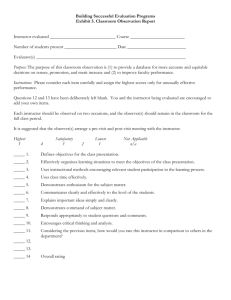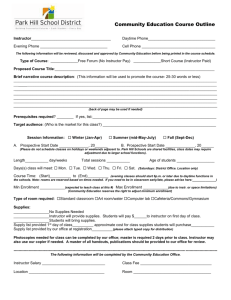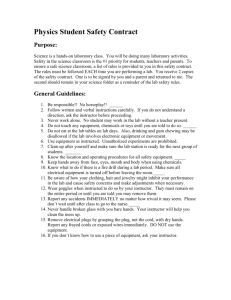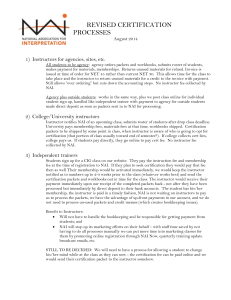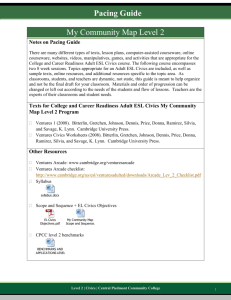Northeastern High School Miss
advertisement
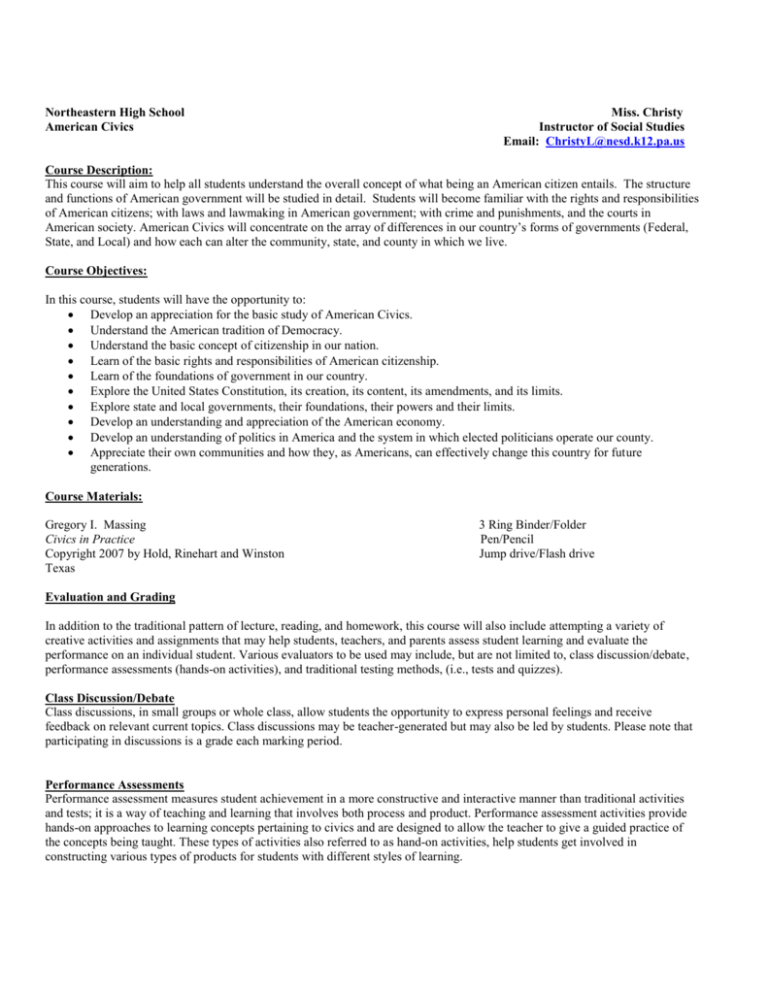
Northeastern High School American Civics Miss. Christy Instructor of Social Studies Email: ChristyL@nesd.k12.pa.us Course Description: This course will aim to help all students understand the overall concept of what being an American citizen entails. The structure and functions of American government will be studied in detail. Students will become familiar with the rights and responsibilities of American citizens; with laws and lawmaking in American government; with crime and punishments, and the courts in American society. American Civics will concentrate on the array of differences in our country’s forms of governments (Federal, State, and Local) and how each can alter the community, state, and county in which we live. Course Objectives: In this course, students will have the opportunity to: Develop an appreciation for the basic study of American Civics. Understand the American tradition of Democracy. Understand the basic concept of citizenship in our nation. Learn of the basic rights and responsibilities of American citizenship. Learn of the foundations of government in our country. Explore the United States Constitution, its creation, its content, its amendments, and its limits. Explore state and local governments, their foundations, their powers and their limits. Develop an understanding and appreciation of the American economy. Develop an understanding of politics in America and the system in which elected politicians operate our county. Appreciate their own communities and how they, as Americans, can effectively change this country for future generations. Course Materials: Gregory I. Massing Civics in Practice Copyright 2007 by Hold, Rinehart and Winston Texas 3 Ring Binder/Folder Pen/Pencil Jump drive/Flash drive Evaluation and Grading In addition to the traditional pattern of lecture, reading, and homework, this course will also include attempting a variety of creative activities and assignments that may help students, teachers, and parents assess student learning and evaluate the performance on an individual student. Various evaluators to be used may include, but are not limited to, class discussion/debate, performance assessments (hands-on activities), and traditional testing methods, (i.e., tests and quizzes). Class Discussion/Debate Class discussions, in small groups or whole class, allow students the opportunity to express personal feelings and receive feedback on relevant current topics. Class discussions may be teacher-generated but may also be led by students. Please note that participating in discussions is a grade each marking period. Performance Assessments Performance assessment measures student achievement in a more constructive and interactive manner than traditional activities and tests; it is a way of teaching and learning that involves both process and product. Performance assessment activities provide hands-on approaches to learning concepts pertaining to civics and are designed to allow the teacher to give a guided practice of the concepts being taught. These types of activities also referred to as hand-on activities, help students get involved in constructing various types of products for students with different styles of learning. Chapter Tests Each chapter test is based on information taken from assigned section readings, assignments, and chapter packets. Chapter packets may be used to complete chapter tests (if deemed appropriate by the instructor). Chapter tests may contain a variety of questions, including multiple choice, true/false, matching, completions, terminology, and essay. Mid-term/Final Exam There will be a mid-term in this class and it will test your knowledge of concepts introduced in chapters 1-4. The final exam will occur at the end of the semester and will test your knowledge of concepts introduced in chapters 5-7 and 16. These are department finals; meaning all students taking civics will have the same test. Chapter Notes Packets Chapter notes packets are used for assessments/a grade in this course. Chapter packets contain important information regarding each section of the chapter. These packets allow students the opportunity to look in the chapter for information that is important and more than likely be on the test. Minimum Competency The minimum competency to pass the course is 70%. Required Work, Assignments, and Testing All assignments are expected in class, on or before the due date. If work is turned in late, a penalty will be given (points taken off). In addition, students will be issued after school detention the following day if homework is not complete. Students will have until the following day to submit it so that the detention does not have to be served. Failure to serve a teacher detention will result in an office referral. Students must be prepared to take tests and quizzes on the date assigned by the instructor. The instructor must be notified if a student is unable to take a test prior to the designated date so that an alternate plan may be arranged. If this procedure is not followed, a test may be deemed as an incomplete grade and may be ultimately logged as failing. Accommodations will be made for those students not present due to legal, medical or emergency absences. Tests will be administered in class. It is the student’s responsibility to ensure proper class attendance in order to gain any points allotted from a test. The instructor reserves the right to designate an alternate date for any test not taken by a student, within five school days. It is the student’s responsibility to be available on said date. Guidelines and Expectations Students are expected to be aware of all policies (as outlined in the Northeastern Student Discipline Code). Students are further expected to abide by all given instructor expectations (also discussed in class). You are old enough to know! Extra-Curricular Activities This course takes precedent over any extra-curricular activity in which students may wish to take part. Students involved in any school related music program, athletic program and/or extra-curricular activity will be held individually accountable for any missed information and assignments/projects given by the Instructor. Part-Time/Full-time employment This course takes precedent over any part-time/full-time employment students may be hired to perform outside of school. It is the responsibility of students to attend class regularly and complete required work, regardless of employment. **PLEASE NOTE: The Instructor reserves the right to modify this course overview at any time.




